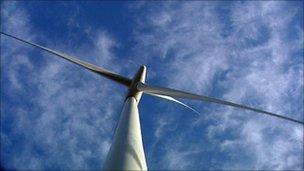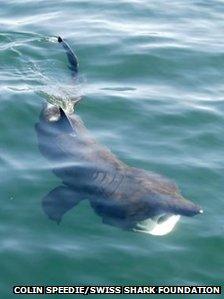Plans for £5.4bn Argyll Array offshore wind farm near Tiree dropped
- Published

Up to 300 wind turbines were planned for the Argyll Array near Tiree
Plans for a £5.4bn offshore wind farm off the coast of Tiree in the Inner Hebrides have been dropped.
Scottish Power Renewables (SPR) announced it would not proceed with the Argyll Array scheme following technical and environmental site studies.
It would have had up to 300 turbines and a capacity of up to 1800MW, enough to power one million homes.
SPR cited construction issues and "a significant presence" of basking sharks in the area for its decision.
Campaigners against the wind farm welcomed the decision, saying it would have been "an environmental disaster" for Tiree and the west coast of Scotland.
SPR had initially planned for the wind farm to start producing power in 2020.
But it said it did not consider the project to be financially viable in the short term.
It said it could be 10 to 15 years before for technology improved enough to make the project viable.
The decision to drop development work was taken by SPR and the Crown Estate, which manages the seabed around the UK.
Project delay
In October 2012, the Crown Estate granted a lease for the offshore site, which is located 5km off Tiree and covers about 360 sq km.
But SPR then delayed the project for 12 months in order to complete a series of studies.
In a statement on Friday, SPR said it had found that construction of the array could be impacted by ground conditions at the site, particularly the presence of hard rock, coupled with "challenging wave conditions".
It also highlighted the presence of basking sharks, which it said environmental groups continued to study to get a greater understanding of their movements in the area.
Jonathan Cole, head of offshore wind at SPR, said: "We believe it is possible to develop the Argyll Array site, it has the some of the best wind conditions of any offshore zone in the UK.
"However, it is our view that the Argyll Array project is not financially viable in the short term.
"As cost reductions continue to filter through the offshore wind industry, and as construction techniques and turbine technology continues to improve, we believe that the Argyll Array could become a viable project in the long term."
'Progress slower'
He added: "The rate of progress in development of foundation and installation technology has been slower than anticipated.
"The current outlook for offshore wind deployment in the UK suggests this will not significantly improve in the short term.

A study found a "significant presence" of basking sharks in the area
"This supports the view that it could take 10-15 years for the required technology improvements to be available for this project."
SPR said it made its decision before the UK government announced plans earlier this month to cut support for onshore wind and solar energy, but give more backing to offshore wind power.
Campaigners against the Argyll Array proposals welcomed the decision to drop the project.
No Tiree Array said in a statement that if the wind farm had gone ahead, it would have been "an environmental disaster" for Tiree and the west coast of Scotland.
RSPB Scotland also welcomed the decision, saying the site was "internationally important" for a range of marine wildlife.
The charity's head of planning and development, Aedan Smith, said: "Being a responsible developer, SPR recognised this extreme importance for wildlife early on and worked closely with RSPB Scotland throughout the development of the project.
"SPR deserve credit for taking these concerns into account from an early stage.
"We remain confident that offshore wind can be developed in Scotland but it will require very careful site assessment combined with a clear commitment from government to invest in improved management and care of our marine environment."
'Thorough assessment'
The Crown Estate said the decision not to proceed with the array had followed a "very thorough assessment" of a wide range of factors.
Ronnie Quinn, who leads The Crown Estate's Scottish Energy & Infrastructure team, said: "While there is an excellent wind resource at the Argyll Array site, both organisations agree that the project should not proceed at this point in time."
Last month plans for a huge wind farm off the north Devon coast were shelved by developer RWE Innogy.
The scheme, which had not yet received the go-ahead, had attracted criticism, with environmentalists worried about its impact on marine wildlife in the Bristol Channel.
RWE Innogy said it was "not the right time" for the project.
Despite dropping the Argyll Array development, SPR said it remained committed to offshore wind projects in the UK - including its 389MW West of Duddon Sands wind farm which is currently under construction in the Irish Sea with Dong Energy.
SPR have also submitted an application for consent with Vattenfall for the East Anglia ONE offshore wind farm, which could have a capacity of up to 1200MW.
- Published13 December 2013
- Published4 December 2013
- Published26 November 2013
- Published26 November 2013
- Published11 December 2012
- Published12 July 2012
- Published27 September 2011
- Published18 March 2011